
TIJDSCHRIFT VOOR ECONOMISCHE EN SOCIALE GEOGRAFIE
Scope & Guideline
Unveiling Contemporary Socio-Economic Challenges
Introduction
Aims and Scopes
- Economic Geography and Local Development:
The journal emphasizes the study of economic systems and local development strategies, examining how regional economies adapt to global changes and local initiatives. This includes topics like tourism, infrastructure development, and the role of local actors. - Social Dynamics and Spatial Inequalities:
TESG explores the social dimensions of geography, focusing on issues such as migration, housing, gentrification, and urban inequalities. The journal seeks to understand how social factors are intertwined with spatial practices and policies. - Regional Identity and Cultural Geography:
The journal investigates the formation and transformation of regional identities and cultural landscapes. It examines how territorial identities are constructed and how they influence social relations and economic activities. - Environmental Sustainability and Climate Change:
There is a strong emphasis on sustainability, particularly in relation to climate change and environmental behavior. The journal publishes research on local responses to global environmental challenges and the implications for regional planning. - Methodological Innovations in Geography:
TESG encourages the use of innovative methodologies in geographical research, including digital tools, spatial analysis, and qualitative approaches. This focus on methodological rigor enhances the robustness of research findings.
Trending and Emerging
- Urban Resilience and Recovery:
An increasing number of studies focus on urban resilience, particularly in the context of recovery from crises such as the COVID-19 pandemic. This theme explores adaptive strategies and the role of community engagement in building resilient urban environments. - Intersectionality and Social Justice:
There is a noticeable trend towards examining intersectionality in social justice contexts, exploring how various identities (e.g., gender, race, class) intersect with spatial practices and contribute to inequalities. - Digital Geographies and Technology's Influence:
Research on digital platforms, smart cities, and technological impacts on geography is gaining traction. This trend reflects the growing importance of technology in shaping economic and social interactions. - Climate Change Adaptation Strategies:
The journal is increasingly publishing research on local adaptation strategies to climate change, focusing on how communities respond to environmental challenges. This includes studies on sustainable practices and policy implications. - Transnational and Cross-Border Dynamics:
Emerging themes include the exploration of transnational connections and cross-border dynamics, particularly in the context of migration and economic interactions, highlighting the complexity of global interconnectedness.
Declining or Waning
- Traditional Industrial Geography:
There has been a noticeable decrease in publications focused on traditional industrial geography, particularly studies that merely describe industrial locations without engaging with broader social or economic dynamics. - Rural Studies with Limited Scope:
Research on rural areas has shifted towards more nuanced discussions of rural-urban interactions and local development, leading to a decline in studies that focus solely on rural issues without considering their urban counterparts. - Quantitative-Only Approaches:
There seems to be a waning interest in purely quantitative studies that do not integrate qualitative insights. The journal’s trend towards interdisciplinary approaches suggests a move away from research that relies solely on quantitative data. - Globalization in a Static Context:
Earlier themes that addressed globalization in a static manner, focusing on its impacts without considering dynamic processes and local responses, are becoming less frequent as researchers adopt more complex frameworks. - Overly Theoretical Discussions:
There is a decline in the publication of papers that engage in overly theoretical discussions without empirical backing. The journal is increasingly valuing empirical research that offers practical insights.
Similar Journals

ZFW-Advances in Economic Geography
Navigating the landscapes of globalization and local markets.ZFW-Advances in Economic Geography, published by WALTER DE GRUYTER GMBH, is an emerging academic journal dedicated to advancing research in the dynamic field of economic geography. With an ISSN of 2748-1956 and an E-ISSN of 2748-1964, this journal aims to provide a platform for innovative studies related to spatial economic interactions, regional development trends, and the impact of globalization on local markets. Since its inception, the journal has successfully garnered attention, achieving a commendable Scopus ranking with 69th percentile in Geography, Planning and Development and 65th percentile in Economics and Econometrics, affirming its relevance among scholars. Set to lead the discourse in economic geography from 2022 to 2024, ZFW encourages a diverse range of contributions, including empirical research, theoretical frameworks, and policy implications, to address the pressing challenges in the economic landscape. Although currently not open access, the journal's commitment to disseminating high-quality knowledge ensures its significance for researchers, professionals, and students alike, striving to deepen their understanding of the intricate relationships between geography and economics.
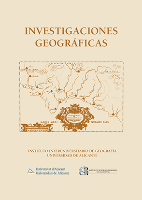
Investigaciones Geograficas-Spain
Connecting global insights through open access research.Investigaciones Geográficas-Spain is an esteemed academic journal published by the Universidad de Alicante, dedicated to advancing the fields of geography, planning, and development as well as earth and planetary sciences. With its commitment to open access since 1983, the journal ensures that research is readily available to a global audience, facilitating knowledge dissemination and collaborative discourse. As reflected in its 2023 Scopus rankings, it holds a commendable position within the Q3 category in both Earth and Planetary Sciences and Geography, Planning and Development, making it a noteworthy resource for scholars and practitioners in these disciplines. The journal's scope encompasses diverse geographical research, aiming to address pressing environmental and societal challenges through empirical studies and theoretical advancements. By contributing to the knowledge reservoir from Spain and beyond, Investigaciones Geográficas-Spain serves as a vital platform for researchers, professionals, and students seeking to enrich their understanding of geographical phenomena.
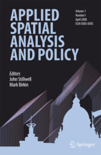
Applied Spatial Analysis and Policy
Empowering decision-makers through spatial analysis.Applied Spatial Analysis and Policy, published by Springer, is a leading journal dedicated to advancing knowledge in the field of spatial analysis and its application in policy-making. With an ISSN of 1874-463X and an E-ISSN of 1874-4621, this peer-reviewed journal has been at the forefront of geographical research since its inception in 2009 and continues to thrive with a convergence extending to 2024. As a recognized publication in the Geography, Planning and Development category, it holds a commendable Q2 quartile ranking for 2023 and is positioned at rank #238 out of 821 in the Scopus classification, reflecting its strong impact and relevance within the academic community with a percentile of 71. The journal provides a robust platform for researchers and professionals to explore innovative methodologies and empirical studies that enrich spatial policy frameworks. While access to individual articles is not open access, its significant contribution to the field makes it a vital resource for anyone involved in spatial analysis and related disciplines.
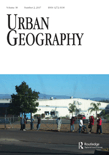
URBAN GEOGRAPHY
Innovating Understanding of Urban DynamicsURBAN GEOGRAPHY, published by Routledge Journals, Taylor & Francis Ltd, is a leading interdisciplinary journal that has been at the forefront of urban studies since its inception in 1980. With an impact factor that positions it in the prestigious Q1 category in both Geography, Planning and Development and Urban Studies, this journal is recognized for its rigorous research that informs policy and practice in urban environments. With a Scopus ranking of #20 out of 279 in the field of Urban Studies and #79 out of 821 in Geography, Planning and Development, it offers valuable insights for scholars, professionals, and students alike—enhancing our understanding of the complex dynamics that shape urban spaces. URBAN GEOGRAPHY is pivotal for those looking to advance their expertise in urban analytical frameworks, urbanization trends, and sustainable development strategies. Submissions are welcomed from a diverse range of perspectives, making it a vital resource for anyone invested in the future of urban landscapes.

Documents d Analisi Geografica
Empowering Global Discourse in Geography and PlanningDocuments d'Anàlisi Geogràfica is a distinguished academic journal published by Universitat Autònoma de Barcelona, focusing on the fields of geography, planning, and earth-surface processes since its inception in 1988. With an Open Access policy implemented in 2012, the journal aims to facilitate the widespread dissemination of geographical research and insights, accessible to a global audience. Currently ranked in Q3 for both Earth-Surface Processes and Geography, Planning and Development categories, it serves as a vital platform for researchers, practitioners, and students to share their findings and enhance knowledge in these critical fields. The journal is indexed in Scopus, where it stands at rank #470 in Social Sciences and #106 in Earth and Planetary Sciences, reflecting its growing impact in relevant academic communities. Based in Barcelona, Spain, Documents d'Anàlisi Geogràfica continues to contribute substantially to geographical scholarship by exploring contemporary issues and advancements in a rapidly evolving world.
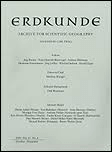
Erdkunde
Illuminating Contemporary Trends in Geographic ResearchErdkunde is a pivotal academic journal published by the Geographisches Institut, University of Bonn, dedicated to the fields of Geography, Earth and Planetary Sciences, and Ecology. With a history dating back to 1976, this journal serves as a platform for interdisciplinary research and discourse, reflecting diverse perspectives from both theoretical and applied dimensions within these domains. Published in Germany, it currently holds a respectable position within the academic community, classified in Q2 for Geography, Planning and Development and Q3 in Ecology and Earth and Planetary Sciences. Although not an open-access journal, its contribution is significant, offering insights that advance our understanding of spatial dynamics and environmental processes. With Scopus rankings that place it within the median range, Erdkunde is an essential resource for researchers, professionals, and students looking to deepen their knowledge and engage with contemporary trends in geographic research.

GEOGRAFICKY CASOPIS-Geographical Journal
Elevating geographic research through interdisciplinary collaboration.GEOGRAFICKY CASOPIS-Geographical Journal is a prestigious publication dedicated to advancing knowledge in the fields of geography and earth sciences, published by the SLOVAK ACADEMY OF SCIENCES, INSTITUTE OF GEOGRAPHY. With a rich history dating back to its inception in 1976, the journal serves as a vital forum for researchers and professionals to disseminate their findings across a range of topics including earth-surface processes, geography, planning, development, and geology. Notably, it maintains a respectable Q3 category ranking across these disciplines as of 2023, indicating its contribution to relevant academic discourse. The journal is indexed under critical databases and engages a global audience, making it an essential resource for scholars seeking to stay informed about contemporary issues and advancements in geography. Although currently not an open-access journal, it emphasizes the sharing of significant research findings and encourages submissions from various geographical contexts to enrich the scientific community. Geographical Journal's commitment to fostering interdisciplinary dialogue ensures its relevance and importance in shaping the future of geographical research.

Hrvatski Geografski Glasnik-Croatian Geographical Bulletin
Fostering Global Collaboration in Geographical ResearchHrvatski Geografski Glasnik-Croatian Geographical Bulletin, ISSN 1331-5854, E-ISSN 1848-6401, is an esteemed open-access journal published by the Croatian Geographical Society that has been serving the geography community since 1929. Based in Zagreb, Croatia, this journal focuses on a broad spectrum of geographical research, providing a platform for the dissemination of original articles, reviews, and case studies that contribute to the understanding of earth-surface processes and development planning. Although it currently holds Q4 rankings in both Earth-Surface Processes and Geography, Planning and Development, the journal is dedicated to enhancing its impact within the scientific community, aspiring to elevate research visibility and collaborative opportunities. With a commitment to open access, it ensures that all content is readily available to researchers, professionals, and students worldwide, fostering an inclusive environment for geographical scholarship. Engaging with this journal presents an opportunity to stay updated with emerging trends and pivotal studies within the discipline throughout its converged years from 1998 to 2024, making it a vital resource in geography and related fields.
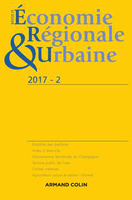
Revue d Economie Regionale et Urbaine
Advancing insights in regional and urban economics.Revue d Economie Regionale et Urbaine is a prestigious journal published by ARMAND COLIN, dedicated to advancing the field of regional and urban economics. Renowned for its rigorous peer-reviewed articles, this journal provides a vital platform for scholars, practitioners, and students to explore contemporary issues, methodologies, and case studies in regional development, urban policy, and economic geography. With its ISSN 0180-7307 and E-ISSN 2107-0865, the journal facilitates widespread dissemination of knowledge, although it currently does not offer open access options. Situated in Paris, France, Revue d Economie Regionale et Urbaine plays a critical role in fostering dialogue and innovation among academics and policymakers alike, contributing significantly to the understanding and enhancement of urban and regional economies.

Regional Statistics
Innovative Perspectives on Regional IssuesRegional Statistics, published by the Hungarian Central Statistical Office, is a leading scholarly journal that plays a pivotal role in enhancing the understanding of regional development and statistical analysis. With its ISSN 2063-9538 and E-ISSN 2064-8243, this open-access journal contributes significantly to various fields, including Cultural Studies, Economics, Geography, and Public Administration. The journal has established itself with impressive Scopus rankings, placing it in the top percentiles across multiple categories, evidencing its high-quality research outputs. Covering converged years from 2015 to 2024, Regional Statistics publishes insightful articles that address pressing regional issues, making it an invaluable resource for researchers, professionals, and students alike who are interested in the quantitative dimensions of society. With a reputation bolstered by its Q1 and Q2 categorizations in various disciplines, this journal is not only committed to advancing statistical knowledge but also to fostering interdisciplinary dialogue among statisticians, policymakers, and social scientists.